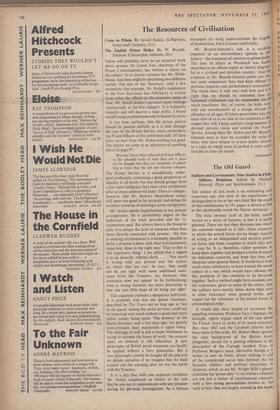The Resources of Civilisation
THERE will probably never be an impartial book about prisons. Sir Lionel Fox, chairman of the Prison Commissioners, has written a classic.. on- the subject. So in shorter compass has Mr. Wilde- blood. And they might be describing_two different worlds. The rest of the 'literature,' with a few exceptions (for example, Mr. Rolph's supplement to the New Statesman last February), is written from either the officiaL or the prisoners' point of view. Mr. Sewell Stokes's personal report belongs unashamedly to the first category. It is brilliantly readable and will deserve a wide public. I found myself-stung to admiration-and irritation by turns:
It was time, perhaps, that the prison picture should be painted skilfully as it is seen through the eyes of the Prison Service, more particularly the Prison Officers of the uniformed staff. Of these latter we hear from Mr. Stokes nothing but good. The nearest we come to an admission of anything else is on page 97 :
Because 1 have often referred to Prison Officers as the splendid body of men they are it must not be thought that they are incapable of admit- ting at times that the job can become irksome.
The Prison Service is a scandalously under- paid profession, containing a good proportion of idealists at all levels. No one should grudge them a few more halfpence than their strict entitlement after so many undeserved kicks. There is a danger, however, that Mr. Stokes's rhapsodised eulogy will seem too good to be accurate and defeat his excellent intention of securing a juster recognition.
Mr. Stokes admits imperfections in bur present arrangements. He is particularly cogent on the feebleness of the work provided and the re- muneration paid. But always there is the financial alibi. It is always the fault of someone other than those directly concerned with prisons : 'All that in existing circumstances it is humanly possible to do for a prisoner is done. And, what is so immensely important, done in the right way.' That to him is 'the impressive thing.' I am afraid that I regard it as an absurdly inflated claim. . . . 'Not much is wrong with our prisons and the system on which they ire run,' he says, 'that could not be put right with some additional assis- tance from the Treasury. As, however, that assistance does not appear to be forthcoming, what is wrong becomes the more distressing in that one sees little hope of its being put right.'.
This argument contains a dangerous half-truth. It is probably true that our prison treatment, described by The Times not so long ago as 'last in the queue' among the social services, could not be improved very much without a good deal more public money being spent. 'The prisons,' as the Home Secretary said a few days ago, 'are grossly over-crowded; their population is again rising.' The shortage of staff is still a major bottleneck in trying to increase the hours of work; the amount spent on research is still ridiculous. A new philosophy of British penal treatment can hardly be applied without a fairy godmother. But a new philosophy cannot be bought off the peg and we delude ourselves if we imagine that we shall acquire one the morning after we win the battle with the Treasury.
It is a pity that with one apparent exception Mr. Stokes, acquiesced so tamely in the rule that he was not to communicate with any prisoner during his personal investigation. As a human
document his study underestimates the tragedy of broken lives, but it is honest and kindly.
Mr. Branch-Johnson's tale is a scathing exposure of an extraordinary episode in our history—the treatment of convicts in prison hulks. The state of affairs at Woolwich was finally described in an official report as 'utterly disgrace' ful to a civilised and christian country.' And the evidence, as Mr. Branch-Johnson points out, vas not more sensational than- had been offered to pretious inquiries and parliamentary committees. The whole story is told very well here and it is right that we should be reminded how an honoured civilisation: can he responsible• for so much beastliness. But, of course, the hulks were only one manifestation of a savage attitude lo offenders of all ages. If future generations take the same view of us as we take of our ancestors in this respect they will, I hope, exempt a large number of devoted persons inside and outside the Prison Service. Among them Mr. Stokes and Mr. Branch' 'Johnson must at least be accorded the niche of those who have helped to arouse public interest in a topic to which most of us find it more com- fortable to close our minds.
PAKENHAM










































































 Previous page
Previous page